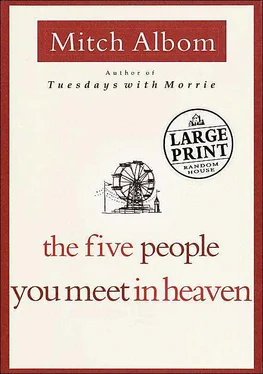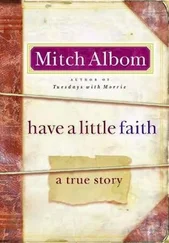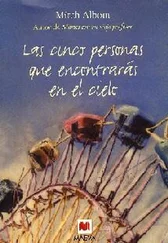An amusement park in California introduced the first tubular steel tracks—they twisted at severe angles unachievable with wood—and suddenly, roller coasters, which had faded to near oblivion, were back in fashion. Mr. Bullock, the park owner, had ordered a steel-track model for Ruby Pier, and Eddie oversaw the construction. He barked at the installers, checking their every move. He didn’t trust anything this fast. Sixty-degree angles? He was sure someone would get hurt. Anyhow, it gave him a distraction.
The Stardust Band Shell was torn down. So was the Zipper ride. And the Tunnel of Love, which kids found too corny now. A few years later, a new boat ride called a log flume was constructed, and, to Eddie’s surprise, it was hugely popular. The riders floated through troughs of water and dropped, at the end, into a large splash pool. Eddie couldn’t figure why people so loved getting wet, when the ocean was 300 yards away. But he maintained it just the same, working shoeless in the water, ensuring that the boats never loosened from the tracks.
In time, husband and wife began talking again, and one night, Eddie even spoke about adopting. Marguerite rubbed her forehead and said, “We’re too old now.”
Eddie said, “What’s too old to a child?”
The years passed. And while a child never came, their wound slowly healed, and their companionship rose to fill the space they were saving for another. In the mornings, she made him toast and coffee, and he dropped her at her cleaning job then drove back to the pier. Sometimes, in the afternoons, she got off early and walked the boardwalk with him, following his rounds, riding carousel horses or yellow-painted clamshells as Eddie explained the rotors and cables and listened for the engines’ hum.
One July evening, they found themselves walking by the ocean, eating grape popsicles, their bare feet sinking in the wet sand. They looked around and realized they were the oldest people on the beach.
Marguerite said something about the bikini bathing suits the young girls were wearing and how she would never have the nerve to wear such a thing. Eddie said the girls were lucky, because if she did the men would not look at anyone else. And even though by this point Marguerite was in her mid-40s and her hips had thickened and a web of small lines had formed around her eyes, she thanked Eddie gratefully and looked at his crooked nose and wide jaw. The waters of their love fell again from above and soaked them as surely as the sea that gathered at their feet.
Three years later, she was breading chicken cutlets in the kitchen of their apartment, the one they had kept all this time, long after Eddie’s mother had died, because Marguerite said it reminded her of when they were kids, and she liked to see the old carousel out the window. Suddenly, without warning, the fingers of her right hand stretched open uncontrollably. They moved backward. They would not close. The cutlet slid from her palm. It fell into the sink. Her arm throbbed. Her breathing quickened. She stared for a moment at this hand with the locked fingers that appeared to belong to someone else, someone gripping a large, invisible jar. Then everything went dizzy.
“Eddie?” she called, but by the time he arrived, she had passed out on the floor.
It was, they would determine, a tumor on the brain, and her decline would be like many others, treatments that made the disease seem mild, hair falling out in patches, mornings spent with noisy radiation machines and evenings spent vomiting in a hospital toilet.
In the final days, when cancer was ruled the victor, the doctors said only, “Rest. Take it easy.” When she asked questions, they nodded sympathetically, as if their nods were medicine doled out with a dropper. She realized this was protocol, their way of being nice while being helpless, and when one of them suggested “getting your affairs in order,” she asked to be released from the hospital. She told more than asked.
Eddie helped her up the stairs and hung her coat as she looked around the apartment. She wanted to cook but he made her sit, and he heated some water for tea. He had purchased lamb chops the day before, and that night he bumbled through a dinner with several invited friends and coworkers, most of whom greeted Marguerite and her sallow complexion with sentences like, “Well, look who’s back!” as if this were a homecoming and not a farewell party.
They ate mashed potatoes from a CorningWare dish and had butterscotch brownies for dessert, and when Marguerite finished a second glass of wine, Eddie took the bottle and poured her a third.
Two days later, she awoke with a scream. He drove her to the hospital in the predawn silence. They spoke in short sentences, what doctor might be on, who Eddie should call. And even though she was sitting in the seat next to him, Eddie felt her in everything, in the steering wheel, in the gas pedal, in the blinking of his eye, in the clearing of his throat. Every move he made was about hanging on to her.
She was 47.
“You have the card?” she asked him.
“The card …” he said blankly.
She drew a deep breath and closed her eyes, and her voice was thinner when she resumed speaking, as if that breath had cost her dearly.
“Insurance,” she croaked.
“Yeah, yeah,” he said quickly. “I got the card.”
They parked in the lot and Eddie shut the engine. It was suddenly too still and too quiet. He heard every tiny sound, the squeak of his body on the leather seat, the ca-cunk of the door handle, the rush of outside air, his feet on the pavement, the jangle of his keys.
He opened her door and helped her get out. Her shoulders were scrunched up near her jaws, like a freezing child. Her hair blew across her face. She sniffed and lifted her eyes to the horizon. She motioned to Eddie and nodded toward the distant top of a big, white amusement ride, with red carts dangling like tree ornaments.
“You can see it from here,” she said.
“The Ferris wheel?” he said. She looked away.
“Home.”
Because he had not slept in heaven, it was Eddie’s perception that he had not spent more than a few hours with any of the people he’d met. Then again, without night or day, without sleeping or waking, without sunsets or high tides or meals or schedules, how did he know?
With Marguerite, he wanted only time—more and more time—and he was granted it, nighttimes and daytimes and nighttimes again. They walked through the doors of the assorted weddings and spoke of everything he wished to speak about. At a Swedish ceremony, Eddie told her about his brother, Joe, who had died 10 years earlier from a heart attack, just a month after purchasing a new condominium in Florida. At a Russian ceremony, she asked if he had kept the old apartment, and he said that he had, and she said she was glad. At an outdoor ceremony in a Lebanese village, he spoke about what had happened to him here in heaven, and she seemed to listen and know at the same time. He spoke of the Blue Man and his story, why some die when others live, and he spoke about the Captain and his tale of sacrifice. When he spoke about his father, Marguerite recalled the many nights he had spent enraged at the man, confounded by his silence. Eddie told her he had made things square, and her eyebrows lifted and her lips spread and Eddie felt an old, warm feeling he had missed for years, the simple act of making his wife happy.
One night, Eddie spoke about the changes at Ruby Pier, how the old rides had been torn down, how the pennywhistle music at the arcade was now blaring rock ‘n’ roll, how the roller coasters now had corkscrew twists and carts that hung down from the tracks, how the “dark” rides, which once meant cowboy cutouts in glow paint, were full of video screens now, like watching television all the time.
Читать дальше












